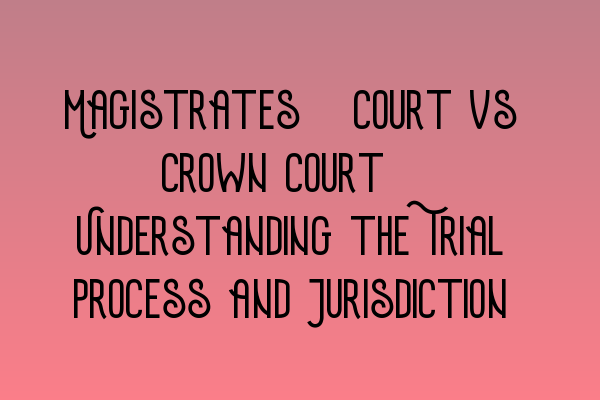Magistrates’ Court vs Crown Court: Understanding the Trial Process and Jurisdiction
When it comes to criminal trials in the UK, there are two types of courts that handle different types of cases: Magistrates’ Court and Crown Court. Understanding the differences between these two courts, as well as their trial processes and jurisdictions, is essential for both legal professionals and individuals who may find themselves involved in a criminal case. In this article, we will explore the key aspects of each court and provide a comprehensive overview of their respective roles in the criminal justice system.
Magistrates’ Court: The First Stop in the Criminal Justice System
The Magistrates’ Court is the first stop for most criminal cases in the UK. This court deals with a wide range of less serious offences, known as “summary offences,” including minor assaults, theft, and traffic violations. Magistrates, who are volunteers with legal training, preside over these cases without a jury. They make decisions on both guilt and sentencing.
Trials in the Magistrates’ Court are relatively quick and straightforward, often lasting only a few hours. The focus is on establishing the facts of the case and determining whether the defendant is guilty beyond reasonable doubt. Both the prosecution and the defense present their arguments and evidence. After hearing both sides, the magistrates reach a verdict.
One notable feature of the Magistrates’ Court is the sentencing powers it possesses. Magistrates can impose fines, community sentences, and even custodial sentences for certain offences. However, their sentencing powers are limited, and they cannot exceed a certain threshold. If a more severe sentence is required, the case may be referred to the Crown Court for a trial.
Crown Court: Serious Cases and Jury Trials
The Crown Court deals with more serious criminal cases, including indictable offences, and those that were sent for a trial by the Magistrates’ Court. Indictable offences are serious crimes such as murder, robbery, and drug trafficking. In the Crown Court, the trial is presided over by a Judge and a jury, which consists of twelve members of the public.
The Crown Court trial process is more formal and complex than that of the Magistrates’ Court. The prosecution presents its case, calling witnesses and presenting evidence. The defense then has the opportunity to challenge this evidence and cross-examine the prosecution’s witnesses. Once both sides have presented their arguments, the jury deliberates and reaches a verdict based on the evidence and the Judge’s instructions.
If the defendant is found guilty, the Judge, who has the sole responsibility for sentencing, determines the appropriate punishment within the legal limits. The sentencing options in the Crown Court are broader and can include longer custodial sentences, life imprisonment, and other penalties depending on the severity of the offence.
The Decision: Magistrates’ Court vs Crown Court
Deciding whether a case should be heard in the Magistrates’ Court or the Crown Court depends on several factors. Some offences, such as murder and rape, always go to the Crown Court due to their gravity. Others, like theft or minor assaults, can be handled by either court, but the defendant has the right to choose a jury trial in the Crown Court if they wish.
The decision ultimately rests on the seriousness of the offence and the complexity of the case. If the crime is relatively minor and straightforward, it is likely to be dealt with in the Magistrates’ Court. However, if the offence is serious, complex, or the defendant wishes to have their case heard by a jury, it will be referred to the Crown Court for trial.
Understanding the key differences between the Magistrates’ Court and the Crown Court is crucial for both legal professionals and individuals involved in criminal cases. It helps ensure that cases are handled appropriately and that individuals receive a fair and just trial.
For more information on legal matters and understanding the UK justice system, be sure to check out our related articles:
- LLC Formation Made Simple: Step-by-Step Guide for UK Entrepreneurs
- Business Regulations in the UK: A Comprehensive Overview
- Preparing for the SQE Exam: Strategies and Resources for Success
- SQE Workshops and Webinars: Accelerate Your Exam Preparation
- Delaware Corporate Law for UK Solicitors: Key Insights and Practices
